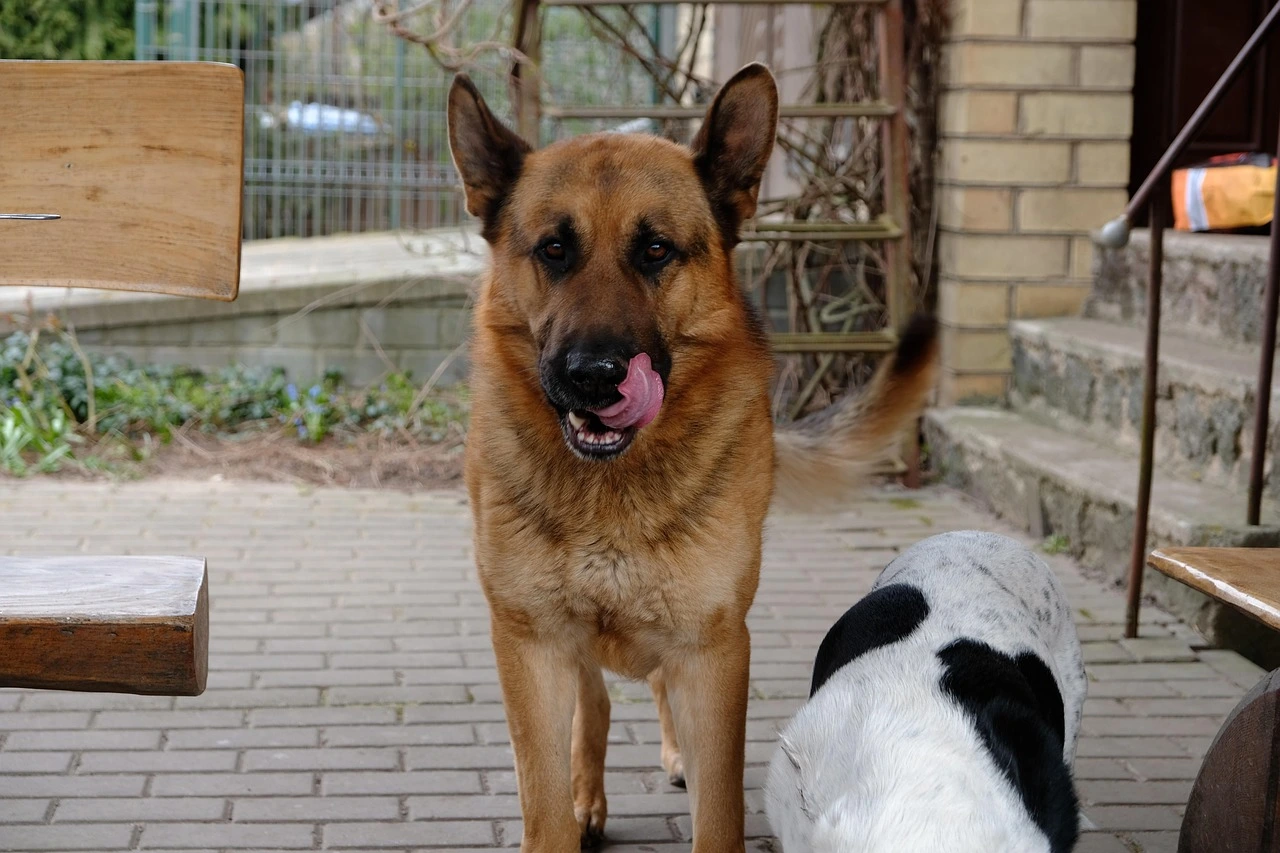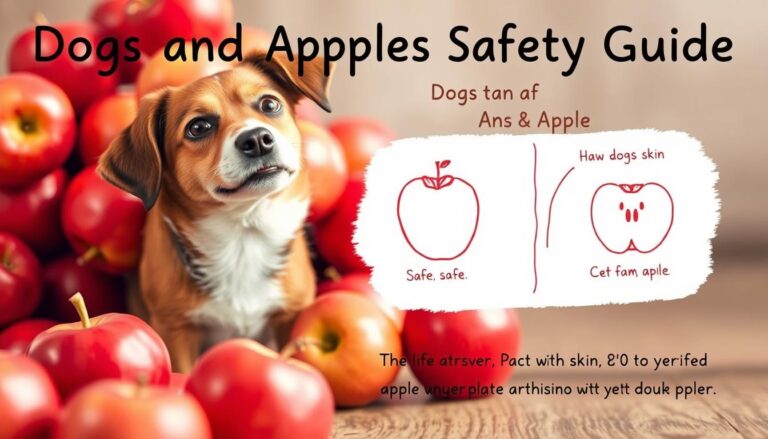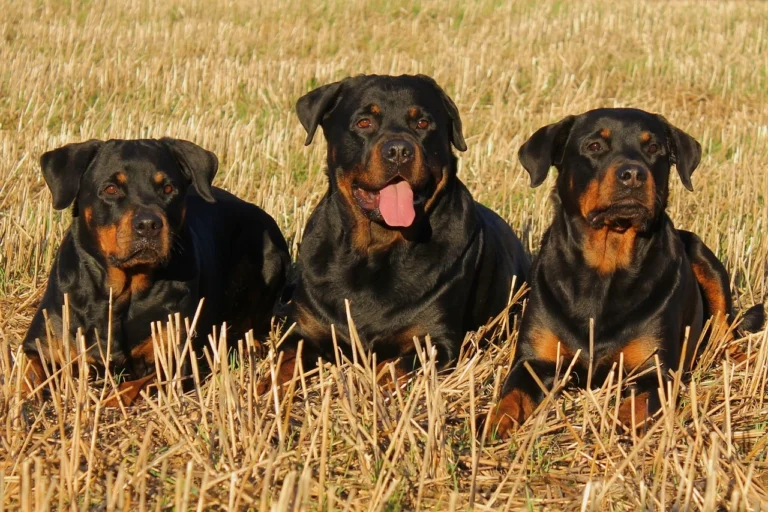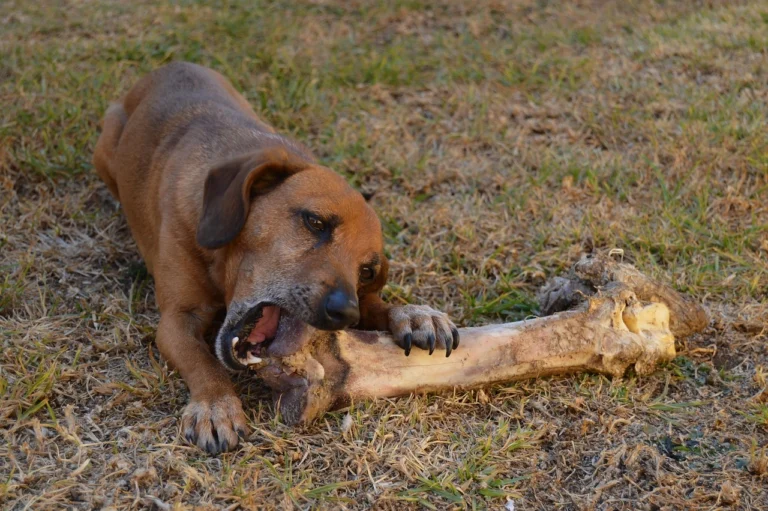Can Dogs Have Turkey Bacon? Safe Feeding Guide
As a dog owner, I know how tempting it is to share snacks with your pet. Turkey bacon seems like a healthier option. But is it safe for dogs?
Choosing the right food for your dog can be tough. You want to give them treats that are good for them. Turkey bacon is a leaner option compared to regular bacon.
This guide will help you understand turkey bacon for dogs. We’ll look at nutrition, risks, and how much to give. This way, you can make the best choices for your dog’s diet.
Every dog is different. What’s good for one might not be for another. Learning about dogs and turkey bacon will help keep your pet healthy and happy.
Let’s find out if turkey bacon can be a treat for dogs or if it’s better to avoid it.
Table of Contents
Understanding Turkey Bacon and Its Components
When thinking about turkey bacon for dogs, it’s key to know what’s in it. Dog-safe turkey bacon needs a close look at its nutrition and ingredients. It’s a leaner choice than pork bacon, which might interest pet owners looking for protein-rich snacks.
Turkey bacon is made from ground turkey, processed to look and feel like regular bacon. The turkey is chosen and prepared carefully to make thin, crispy strips. These strips are appealing to both humans and dogs.
Nutritional Content Breakdown
Knowing the nutritional makeup is important to see if turkey bacon is safe for dogs. Here’s a detailed look at its main nutrients:
- Protein content: About 4-6 grams per serving
- Fat content: Less than traditional pork bacon
- Sodium levels: Often higher due to preservation
- Calorie range: Around 30-50 calories per slice
Common Ingredients and Preservation Methods
Commercial turkey bacon includes several key ingredients that pet owners should think about:
- Ground turkey meat
- Salt and sodium nitrate
- Preservatives
- Potential seasonings
The ways turkey bacon is preserved can be risky for dogs. Sodium levels and chemical additives might upset your dog’s stomach. So, it’s important to give it in small amounts.
Processing Techniques
Turkey bacon is made through specific steps to turn raw turkey into thin, crispy strips. These steps include:
- Grinding turkey meat
- Forming into bacon-like shapes
- Curing with salt and preservatives
- Smoking or flavoring
While turkey bacon can be a treat now and then, knowing what’s in it helps you feed it safely to your dog.
Can Dogs Have Turkey Bacon: The Complete Answer
Many pet owners wonder if dogs can eat turkey bacon. While it’s not toxic, it’s not the best choice for your dog. Small amounts might seem okay, but there are key things to remember.
The main worries about turkey bacon for dogs are:
- High sodium content
- Processed meat with potential additives
- Unnecessary calories
- Risk of digestive issues
Can dogs have turkey bacon sometimes? Vets say to be very careful. The meat can upset your dog’s stomach. The sodium in turkey bacon can also cause health problems like:
- Increased blood pressure
- Potential sodium ion poisoning
- Dehydration risks
If you do give turkey bacon, make sure it’s:
- Unseasoned
- Cooked without added oils
- Given in tiny, rare portions
Pet nutrition experts advise against turkey bacon as a regular treat. Your dog’s diet should include balanced, complete foods made for dogs. Instead, choose safer protein sources that are good for your dog’s health without risks.
Always talk to your vet before adding new foods to your dog’s diet.
Health Benefits and Risks of Turkey Bacon for Dogs
Thinking about giving turkey bacon dog treats to your pet? It’s important to know how it might affect their health. Dogs might like turkey bacon, but owners need to think about its good and bad sides.
Even though turkey bacon might seem like a tasty snack, the downsides are often bigger. Here are some key things to keep in mind when feeding your pet.
Nutritional Potential for Dogs
Turkey bacon has some good points:
- It’s a lean protein source
- It’s a low-fat option compared to regular bacon
- It has some important nutrients in small amounts
Significant Health Risks
The dangers of turkey bacon for dogs are real and serious:
| Health Risk | Potential Consequences |
|---|---|
| High Sodium Content | Can raise blood pressure and cause dehydration |
| Processed Ingredients | May lead to stomach problems |
| Preservative Exposure | Could harm your dog’s health over time |
Recognizing Turkey Bacon Intolerance
Look out for these signs if your dog doesn’t like turkey bacon:
- Vomiting
- Diarrhea
- Drinking too much water
- Feeling very tired
- Stomach pain
If your dog shows any of these signs after eating turkey bacon, talk to a vet.
Safe Preparation and Serving Guidelines
When thinking about can dogs have turkey bacon, careful preparation is key. Not all turkey bacon is safe for dogs. Knowing how to serve it right can greatly impact your dog’s health.
Before adding dog safe turkey bacon to your pet’s diet, follow these important steps:
- Choose low-sodium, uncured turkey bacon without added seasonings
- Cook turkey bacon thoroughly to eliminate harmful bacteria
- Cut into small, bite-sized pieces to prevent choking
- Serve as an occasional treat, not a regular meal replacement
Proper cooking is crucial when making turkey bacon for dogs. Raw or undercooked meat can contain dangerous pathogens that might cause serious health issues. Use these cooking tips:
- Bake or pan-fry until crisp and fully cooked
- Drain excess grease completely
- Allow to cool before serving
- Remove any excess fat
Portion control is key when sharing turkey bacon with your dog. The serving size depends on your dog’s weight and overall health. Veterinarians suggest limiting treats to 10% of your dog’s daily caloric intake.
Always introduce new foods gradually and watch for any adverse reactions. If you notice digestive issues or unusual symptoms after feeding turkey bacon, contact your veterinarian immediately.
Comparing Turkey Bacon to Regular Bacon for Dogs
Many pet owners wonder if turkey bacon is safe for dogs compared to regular bacon. Knowing the nutritional differences helps you choose the best for your dog.
Dogs have special dietary needs. Both turkey bacon and regular bacon can be risky for them. Turkey bacon might seem healthier, but it still poses health risks.
Fat Content Differences
Turkey bacon has less fat than pork bacon, which sounds good. But, even low-fat options are not great for dogs. The fat in turkey bacon can lead to weight gain, pancreatitis, and digestive problems.
- Potential weight gain
- Increased risk of pancreatitis
- Digestive system stress
Sodium Levels Comparison
Sodium levels are a big worry with turkey bacon for dogs. Both turkey and pork bacon are high in salt. This is bad for your pet’s health.
| Bacon Type | Average Sodium Content | Dog Safety Rating |
|---|---|---|
| Pork Bacon | High (400-500mg per slice) | Not Recommended |
| Turkey Bacon | Moderate (250-350mg per slice) | Limited Use |
Overall Safety Assessment
Can my dog eat turkey bacon? The answer is yes, but only in small amounts and not often. Vets recommend healthier dog foods instead.
Both turkey bacon and regular bacon have similar dangers. These include too much sodium, extra fat, and stomach problems. Always talk to your vet before giving your dog new foods.
Portion Control and Frequency Recommendations

When giving turkey bacon dog treats, it’s key to watch the portions. Vets say treats should be no more than 10% of your dog’s daily calories. So, turkey bacon should be a rare snack, not a main food.
The size of your dog affects how much turkey bacon they can have. Smaller dogs need less than bigger ones. Can dogs have turkey bacon in small amounts? Yes, but be careful with how much and how often.
- Small dogs (under 20 lbs): 1-2 small pieces per week
- Medium dogs (20-50 lbs): 2-3 small pieces per week
- Large dogs (over 50 lbs): 3-4 small pieces per week
Dogs with health issues like pancreatitis or obesity should not have turkey bacon. Always talk to your vet before adding new treats to your dog’s diet.
| Dog Size | Weekly Turkey Bacon Treats | Caloric Consideration |
|---|---|---|
| Small Breeds | 1-2 pieces | Less than 10 calories |
| Medium Breeds | 2-3 pieces | 10-20 calories |
| Large Breeds | 3-4 pieces | 20-30 calories |
Remember, turkey bacon treats should be lean, low-sodium, and without extra seasonings. Cut them into small pieces to avoid choking and make it easier to control portions.
Alternative Healthy Treats for Dogs
When thinking about turkey bacon for dogs, it’s important to look at safer, healthier options. These treats should be nutritious and safe for your pet. Your dog deserves tasty, healthy choices that help them stay well.
Dogs enjoy trying new foods, and finding safe turkey bacon alternatives can make mealtime fun. It also keeps their diet balanced and nutritious.
Safe Protein Options
Protein is key for your dog’s diet. Here are some good alternatives:
- Plain, cooked lean turkey meat
- Boiled chicken breast
- Cooked fish like salmon
- Eggs (scrambled or boiled)
Homemade Turkey Treats
Making homemade turkey treats lets you pick the ingredients. This ensures they are safe for your dog. Here are easy recipes:
- Baked turkey strips (unseasoned)
- Turkey and sweet potato bites
- Frozen turkey meat cubes
“Homemade treats help you manage your dog’s nutrition while providing delicious rewards.” – Veterinary Nutrition Experts
Commercial Dog-Safe Alternatives
For easy options, choose commercial treats made for dogs. Look for ones with:
- Limited ingredients
- No artificial preservatives
- High-quality protein sources
- Veterinarian-approved formulations
Remember, give new treats in small amounts. Always talk to your vet before adding new foods to your dog’s diet. They can help pick the best options for your pet.
Signs of Overconsumption and When to Contact a Vet

When thinking about whether dogs can eat turkey bacon, it’s key to know the dangers of eating too much. It’s important to watch how much turkey bacon your dog eats to avoid health problems.
Look out for these important signs if your dog eats turkey bacon:
- Persistent vomiting
- Sudden loss of appetite
- Extreme lethargy
- Abdominal pain or swelling
- Unusual weakness
Pancreatitis is a serious condition that can develop from excessive fatty food consumption. The symptoms include:
| Symptom | Severity |
|---|---|
| Hunched back | High Risk |
| Repeated vomiting | Critical |
| Dehydration | Urgent |
| High fever | Immediate Concern |
“If you notice multiple symptoms, contact your veterinarian immediately. Quick intervention can prevent serious health complications.”
Your dog’s health is very important. Even though a little turkey bacon might seem okay, it’s still risky. Always watch what your dog eats and look out for any signs of trouble.
Conclusion
When thinking about can dogs have turkey bacon, pet owners should put their dog’s health first. Turkey bacon dog treats might look good, but they’re not safe. Your dog’s diet needs careful thought.
It’s important to be careful and know what you’re giving your dog. Turkey bacon isn’t toxic in small amounts, but it’s not good for dogs. Vets say to choose better protein sources for your dog’s health.
Being a good pet owner means knowing what your dog eats. If you give turkey bacon, do it rarely and watch for bad reactions. Always talk to your vet about what’s best for your dog’s health.
Your dog’s diet should be balanced and approved by a vet. The joy of a turkey bacon treat isn’t worth risking your dog’s health.







